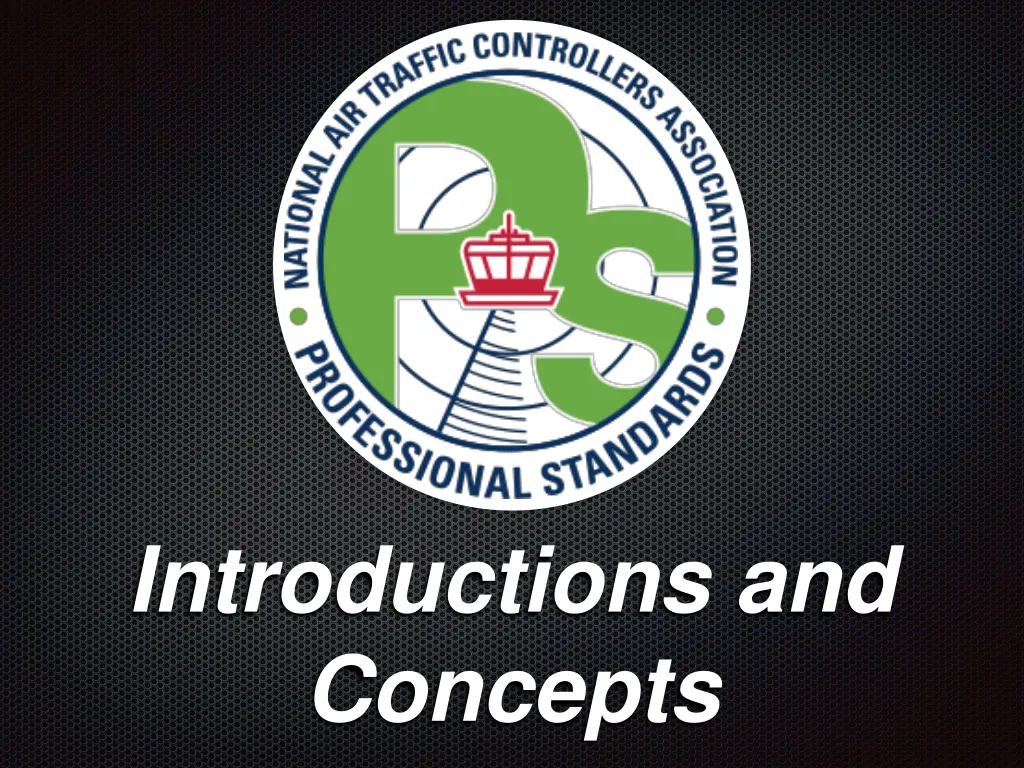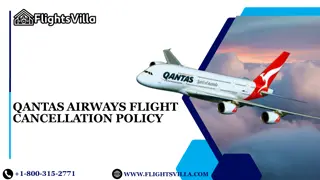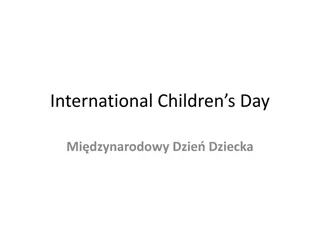
Professional Air Traffic Controller Code and Standards for Safety and Excellence
Learn about the Professional Air Traffic Controller Code, a core component of the NATCA/FAA collective bargaining agreement aimed at promoting the highest standards of professional conduct. This code emphasizes safety, excellence, public trust, and the importance of inspiring professionalism in the National Airspace System. Explore the guidelines that govern the conduct and character of professional air traffic controllers.
Download Presentation

Please find below an Image/Link to download the presentation.
The content on the website is provided AS IS for your information and personal use only. It may not be sold, licensed, or shared on other websites without obtaining consent from the author. If you encounter any issues during the download, it is possible that the publisher has removed the file from their server.
You are allowed to download the files provided on this website for personal or commercial use, subject to the condition that they are used lawfully. All files are the property of their respective owners.
The content on the website is provided AS IS for your information and personal use only. It may not be sold, licensed, or shared on other websites without obtaining consent from the author.
E N D
Presentation Transcript
Introductions and Concepts
Professional Air Traffic Controller Code The goal of the Professional Standards Program, which is contained as a core component of the NATCA/FAA collective bargaining agreement, is to promote and maintain the highest degree of professional conduct among participants. We do that in compliance with the following Air Traffic Controller code: A Professional Air Traffic Controller s performance and actions are a demonstration of their personal commitment to safety, excellence, and upholding their oath to the public trust, most specifically to the users of the National Airspace System. They shall conduct themselves in a manner that instills trust and merits the confidence bestowed on them by the public they serve. A Professional Air Traffic Controller, through his or her own conduct and performance, should inspire, motivate, and provide examples of professionalism to others. The safety of the Airspace system is of the greatest importance and their performance should always demonstrate the highest standard of excellence. A Professional Air Traffic Controller accepts that their actions represent the conduct and character of all members of the profession. They shall act in a manner that brings honor and respect to the profession, establishes public trust, and sets a global standard for excellence.
Professional Air Traffic Controller Code The goal of the Professional Standards Program, which is contained as a core component of the NATCA/FAA collective bargaining agreement, is to promote and maintain the highest degree of professional conduct among participants. We do that in compliance with the following Air Traffic Controller code: A Professional Air Traffic Controller s performance and actions are a demonstration of their personal commitment to safety, excellence, and upholding their oath to the public trust, most specifically to the users of the National Airspace System. They shall conduct themselves in a manner that instills trust and merits the confidence bestowed on them by the public they serve. A Professional Air Traffic Controller, through his or her own conduct and performance, should inspire, motivate, and provide examples of professionalism to others. The safety of the Airspace system is of the greatest importance and their performance should always demonstrate the highest standard of excellence. A Professional Air Traffic Controller accepts that their actions represent the conduct and character of all members of the profession. They shall act in a manner that brings honor and respect to the profession, establishes public trust, and sets a global standard for excellence.
Professional Air Traffic Controller Code The goal of the Professional Standards Program, which is contained as a core component of the NATCA/FAA collective bargaining agreement, is to promote and maintain the highest degree of professional conduct among participants. We do that in compliance with the following Air Traffic Controller code: A Professional Air Traffic Controller s performance and actions are a demonstration of their personal commitment to safety, excellence, and upholding their oath to the public trust, most specifically to the users of the National Airspace System. They shall conduct themselves in a manner that instills trust and merits the confidence bestowed on them by the public they serve. A Professional Air Traffic Controller, through his or her own conduct and performance, should inspire, motivate, and provide examples of professionalism to others. The safety of the Airspace system is of the greatest importance and their performance should always demonstrate the highest standard of excellence. A Professional Air Traffic Controller accepts that their actions represent the conduct and character of all members of the profession. They shall act in a manner that brings honor and respect to the profession, establishes public trust, and sets a global standard for excellence.
Professional Air Traffic Controller Code The goal of the Professional Standards Program, which is contained as a core component of the NATCA/FAA collective bargaining agreement, is to promote and maintain the highest degree of professional conduct among participants. We do that in compliance with the following Air Traffic Controller code: A Professional Air Traffic Controller s performance and actions are a demonstration of their personal commitment to safety, excellence, and upholding their oath to the public trust, most specifically to the users of the National Airspace System. They shall conduct themselves in a manner that instills trust and merits the confidence bestowed on them by the public they serve. A Professional Air Traffic Controller, through his or her own conduct and performance, should inspire, motivate, and provide examples of professionalism to others. The safety of the Airspace system is of the greatest importance and their performance should always demonstrate the highest standard of excellence. A Professional Air Traffic Controller accepts that their actions represent the conduct and character of all members of the profession. They shall act in a manner that brings honor and respect to the profession, establishes public trust, and sets a global standard for excellence.
History Driven by Article 52. Section 1. The Parties at the National level agree to develop the framework for a Professional Standards Program (PSP) using the principles outlined in this Article. The purpose of the Professional Standards Program is to provide an opportunity for bargaining unit employees to address performance and/or conduct of their peers before such issues rise to a level requiring corrective action(s) on the part of the Agency.
Section 4. The Professional Standards Committee (PSC) will be comprised of bargaining unit employees only, appointed by the Principal Facility Representative or his/her designee. There shall be a chairman of the PSC, appointed by the Principal Facility Representative. The National workgroup, in consultation with the volunteer facility, will determine the numbers of BUE s on the facility PSC. The Agency agrees that PSC meetings are to be conducted on duty time, generally not to exceed two (2) hours per pay period. Additional time may be granted, upon request, for committee members unless staffing and workload do not permit. It is the responsibility of the PSC chairman to inform the manager of the need for the committee to meet.
Section 5. The PSC may accept performance and/or conduct based issues from other bargaining unit employees, supervisors, or other Management officials. The acceptance of an issue is at the sole discretion of the committee. Participation in this program is completely voluntary and all parties involved must agree to participate. The committee may identify and recommend other means for improving professionalism and safety.
Section 6. A PSC will not make records in any form (written or recorded) of their meetings while dealing with a particular matter. However, the committee will maintain records of how many issues were brought forward, how many were accepted, and the number that were resolved. These records will be provided to the National workgroup and shall only be used to assist in determining if the program is successful. Lessons learned, generic in nature, will be distributed, as deemed appropriate by the committee, to the workforce. Controller names or identifying information shall not be used. In the event of a performance or behavior-oriented inquiry, an acknowledgement that the issue is resolved or unresolved will be made available to the individual reporting the event.
Section 7. The Agency may elect to use the PSP as an alternative to disciplinary action under Article 10. Issues released to the PSC shall not be addressed through other means or raised in the future to support other disciplinary actions, if the PSC reports that the issue is resolved.
Section 8. PSC members shall be provided access to voice tapes, NTAPs, SATORIs, and other relevant data concerning a reported event. A PSC inquiry shall not be used by the Agency as a triggering event to begin an outside investigation. The Agency shall not pursue action against an employee while the matter is in committee , unless the issue is the subject of an ongoing or current investigation, involves gross negligence, is a criminal offense, or is brought to the attention of the Agency by means other than the PSC inquiry.
History Driven by Article 52. National workgroup established to develop PSC framework. The intent is to create a program that not only compliments and supports ATSAP tenets in an ancillary manner, but also a program that can stand alone in addressing issues in a peer-to- peer manner to enhance the professionalism of the occupation.
What is the Professional Standards Program? The purpose of the Professional Standards Program is to promote and maintain the highest degree of professional conduct among participants. A successful Professional Standards Program will be measured by its ability to address performance and conduct issues before such issues rise to a level requiring corrective action on the part of the Agency.
Policy It is the policy of the Professional Standards Committee (PSC) that all bargaining Unit Employee (BUEs) bring their concerns about the professional conduct of another BUE or any other employee to their associated Professional Standards Committee.
Why Professional Standards?






















